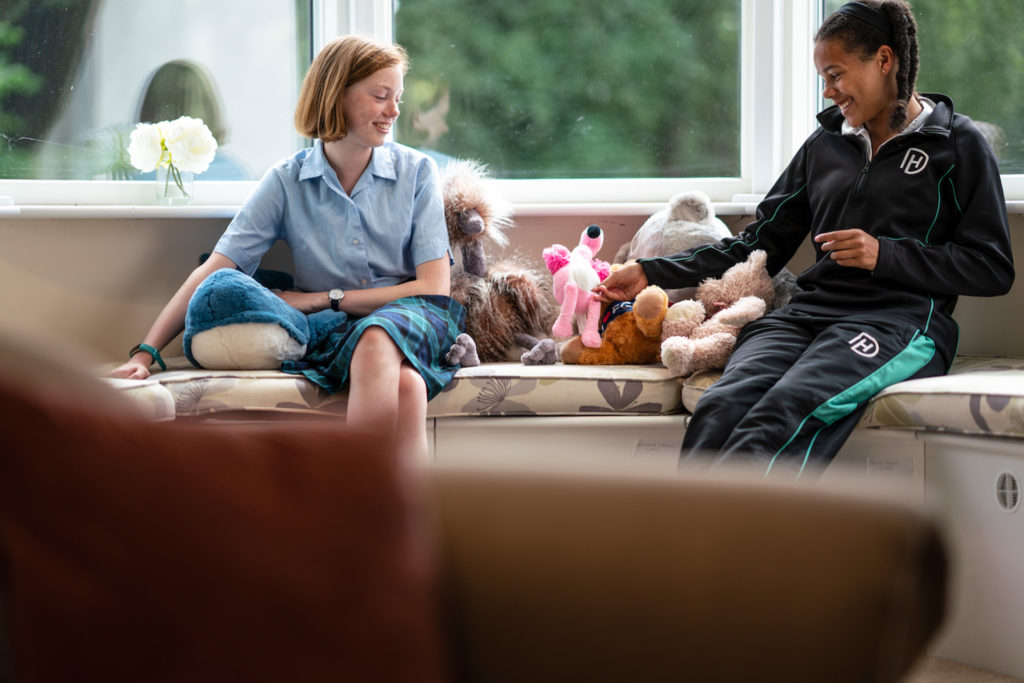From Day to Boarding: Facing Common Fears
By
3 years ago
Matthew Godfrey, Deputy Head at Downe House School in Berkshire, discusses common fears associated with boarding schools.
The experience of boarding has been transformed over the past twenty years or so. Boarding houses
used to be austere; now they are very much homes-from-home: soft furnishings, cosy dorms, open
social spaces, and modern kitchens are par for the course. They also used to be very hierarchical, with little interaction between year groups; now, senior pupils are trained as mentors for younger pupils, talking to them, helping them, and nurturing them as elder siblings might.

The pupils at my school love talking about their paths into boarding and their experiences of making
school their second home. There are many different reasons why children and parents choose to board and often they come with stories or defining moments; for example, one new boarder recently told me: ‘I’ve wanted to board ever since I read Mallory Towers and saw Wild Child.’ Another said: ‘My elder brother loved boarding so I knew it would be okay.’
Dealing with reservations and changing perceptions
Sometimes the path to boarding can be paved with pragmatism too, from considering the value of reduced commutes, to being able to participate more fully in co-curricular activities after school, there are many pros and cons to consider. Of course, some parents and children will also have their reservations about moving from day to boarding, so it is worth checking the following when visiting prospective boarding schools to ensure the environment is the right fit:
1. Is the layout of the boarding house open, welcoming and conducive to community living?
2. What is the daily routine for boarders, including the time before and after lessons?
3. Are the older pupils in the House encouraged and trained to support the younger pupils?
4. Who are the House Staff, what are their roles, and how and when can my child reach them?

Facing fears and embracing support
Feeling nervous is understandable and for pupils this will involve an element of facing fears. Yet this is all part of the boarding process, and it is entirely natural for some pupils to have a bit of a wobble after a few days in their new environment – this is when supportive House Staff come into their own. In most cases, the busy schedule of the school day means that pupils will be naturally tired by the evening, and their adrenalin will have run a bit low. What is wonderful to see, is how, with the right support, they soon pick themselves up again and how they also love supporting and helping one another. The spirit of team and comradery is all part of what makes boarding schools such special places.

Harry Crump is a Housemaster at Radley College in Oxfordshire, a boarding school for boys. When I asked him recently for his views on moving from day to boarding, he told me:
‘Moving to a boarding school is a big change for any 13-year-old, and yet while it’s likely there will be a few wobbles along the way, pupils grow accustomed to new routines very quickly. It can be helpful to have done some boarding at a prep school, but it isn’t essential. It’s much more about making sure the individual pupil’s expectations – and those of their parents – are suitably managed. We also find that the other boys in the boarding house are so supportive and friendly to each other; they are brilliant at helping to deal quickly with any issues that might arise.’

Don’t worry, be happy
The truth is, in the first few weeks, it is inevitable that parents will worry about how their child is getting on in their boarding house. In most cases it is parents who will worry more than their child. One of the Year 8 boarders at Downe House who used to feel anxious from time to time, once shared some wise words from her father with me:
‘My dad gave me some good advice,’ she said. ‘He told me not to spend more than five minutes worrying about something that will not affect me in five years’ time.’

Getting parents ready for the switch into boarding
It is often parents, not their teenage children, who suffer more from separation anxiety. They will need to adjust to new routines: they will no longer see your child so regularly, and it’s likely that they won’t speak to them every day either. Pupils are generally discouraged from speaking too frequently to their parents on the phone in the early days of boarding, because their child’s busy schedule at school will mean they are unlikely to have the opportunity to call. Bear in mind that no news or contact from a child is generally good news: it isn’t that they no longer care about their parents, it’s just that they are busy and having a good time. And it’s fair to say that if a parent communicates their anxiety to their child, their child is more likely to become anxious themselves. Parents will need to learn how to ‘let go’. If parents wish to call their child, it’s worth asking the house staff when the best time is to call, as it can be distracting and upsetting for pupils to receive repeated calls from parents at unexpected times.

Getting children ready to benefit fully from boarding
Does the child have sufficient personal independence prior to embarking on their ‘boarding journey’? Of course, boarding schools are brilliant at instilling and building independence and confidence, but it is helpful if pupils arrive at boarding school without being too reliant on others for emotional and practical support. Ideally, they should be looking forward to being more independent, and with some basic skills in place already, such as knowing what they will need before setting off for a day of lessons, how to organise their room, how to strike up conversations or activities with other boarders, and how they might occupy themselves if they find themselves with some unstructured ‘free’ time.
See Downe House School’s online listing here.

